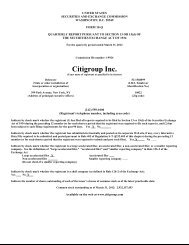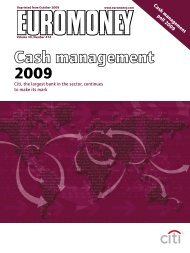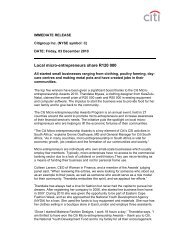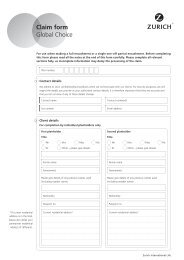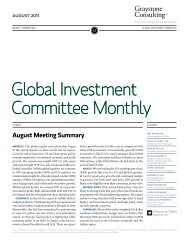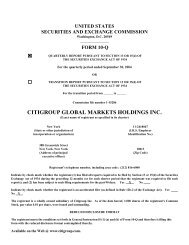The credit rating agencies continuously review the ratingsof <strong>Citigroup</strong> and its subsidiaries, and have particularlyfocused on the impact of the Financial Reform Act onthe ratings support assumptions of U.S. bank holdingcompanies, including <strong>Citigroup</strong>. Reductions in <strong>Citigroup</strong>’sand its subsidiaries’ credit ratings could have a significantand immediate impact on Citi’s funding and liquiditythrough cash obligations, reduced funding capacity andcollateral triggers.Each of <strong>Citigroup</strong>’s and Citibank, N.A.’s long-term/senior debt and shortterm/commercialpaper ratings are currently rated investment grade by Fitch,Moody’s and Standard & Poor’s (S&P). The rating agencies continuouslyevaluate <strong>Citigroup</strong> and its subsidiaries, and their ratings of <strong>Citigroup</strong>’s andits subsidiaries’ long-term and short-term debt are based on a number offactors, including financial strength, as well as factors not entirely withinthe control of <strong>Citigroup</strong> and its subsidiaries, such as conditions affecting thefinancial services industry generally.Moreover, each of Fitch, Moody’s and S&P has indicated that they areevaluating the impact of the Financial Reform Act on the rating supportassumptions currently included in their methodologies as related to largeU.S. bank holding companies, including <strong>Citigroup</strong>. These evaluationsare generally a result of the rating agencies’ belief that the FinancialReform Act, including the establishment and development of the neworderly liquidation regime, increases the uncertainty regarding the U.S.government’s willingness and ability to provide extraordinary support to suchcompanies. Consistent with this belief and to bring <strong>Citigroup</strong> in line withother large U.S. banks, during 2010, S&P and Moody’s revised their outlookson <strong>Citigroup</strong>’s supported ratings from stable to negative, and Fitch placed<strong>Citigroup</strong>’s supported ratings on negative rating watch. The ultimate timingof the completion of the credit rating agencies’ evaluations, as well as theoutcomes, is uncertain.In light of these reviews and the continued focus on the financial servicesindustry generally, <strong>Citigroup</strong> and its subsidiaries may not be able to maintaintheir current respective ratings. Ratings downgrades by Fitch, Moody’s orS&P could have a significant and immediate impact on Citi’s funding andliquidity through cash obligations, reduced funding capacity and collateraltriggers. A reduction in <strong>Citigroup</strong>’s or its subsidiaries’ credit ratings could alsowiden Citi’s credit spreads or otherwise increase its borrowing costs and limitits access to the capital markets. For additional information on the potentialimpact of a reduction in <strong>Citigroup</strong>’s or its subsidiaries’ credit ratings,see “Capital Resources and Liquidity—Funding and Liquidity—CreditRatings” above.The restrictions imposed on proprietary trading and fundsrelatedactivities by the Financial Reform Act and theregulations thereunder will limit <strong>Citigroup</strong>’s trading forits own account and could also, depending on the scope ofthe final regulations, adversely impact <strong>Citigroup</strong>’s marketmakingactivities and force Citi to dispose of certain of itsinvestments at less than fair market value.The so-called “Volcker Rule” provisions of the Financial Reform Act restrictthe proprietary trading activities of depository institutions, entities thatown or control depository institutions and their affiliates. The ultimatecontours of the restrictions on proprietary trading will depend on thefinal regulations. The rulemaking must address, among other things, thescope of permissible market-making and hedging activities. The ultimateoutcome of the rulemaking process as to these and other issues is currentlyuncertain and, accordingly, so is the level of compliance and monitoringcosts and the degree to which <strong>Citigroup</strong>’s trading activities, and the results ofoperations from those activities, will be negatively impacted. In addition, anyrestrictions imposed by final regulations in this area will affect <strong>Citigroup</strong>’strading activities globally, and thus will likely impact it disproportionatelyin comparison to foreign financial institutions which will not be subject tothe Volcker Rule provisions of the Financial Reform Act with respect to theiractivities outside of the United States.In addition, the Volcker Rule restricts <strong>Citigroup</strong>’s funds-related activities,including Citi’s ability to sponsor or invest in private equity and/or hedgefunds. Under the Financial Reform Act, bank regulators have the flexibility toprovide firms with extensions allowing them to hold their otherwise restrictedinvestments in private equity and hedge funds for some time beyondthe statutory divestment period. If the regulators elect not to grant suchextensions, Citi could be forced to divest certain of its investments in illiquidfunds in the secondary market on an untimely basis. Based on the illiquidnature of the investments and the prospect that other industry participantssubject to similar requirements would likely be divesting similar assets atthe same time, such sales could be at substantial discounts to their otherwisecurrent fair market value.The establishment of the new Bureau of ConsumerFinancial Protection, as well as other provisions of theFinancial Reform Act and ensuing regulations, could affectCiti’s practices and operations with respect to a number ofits U.S. Consumer businesses and increase its costs.The Financial Reform Act established the Bureau of Consumer FinancialProtection (CFPB), an independent agency within the Federal ReserveBoard. The CFPB was given rulemaking authority over most providers ofconsumer financial services in the U.S. as well as enforcement authorityover the consumer operations of banks with assets over $10 billion, such asCitibank, N.A. The CFPB was also given interpretive authority with respectto numerous existing consumer financial services regulations (such asRegulation Z, Truth in Lending) that were previously interpreted by theFederal Reserve Board. Because this is an entirely new agency, the impacton <strong>Citigroup</strong>, including its retail banking, mortgages and cards businesses,74
is largely uncertain. However, any new regulatory requirements, or modifiedinterpretations of existing regulations, will affect Citi’s U.S. Consumerpractices and operations, potentially resulting in increased compliance costs.Moreover, the Financial Reform Act also provides authority to the SEC todetermine fiduciary duty standards applicable to brokers of retail customers.Any new such standards could also affect <strong>Citigroup</strong>’s business practices withretail investment customers and could have indirect additional effects onstandards applicable to business with certain institutional customers.In addition, the Financial Reform Act fundamentally altered the currentbalance between state and federal regulation of consumer financial law.The provisions of the Financial Reform Act relating to the doctrine of“federal preemption” may allow a broader application of state consumerfinancial laws to federally chartered institutions such as Citibank, N.A.and Citibank (South Dakota), N.A. In addition, the Financial Reform Acteliminated federal preemption protection for operating subsidiaries such asCitiMortgage, <strong>Inc</strong>. The Financial Reform Act also allows state authoritiesto bring certain types of enforcement actions against national banksunder applicable law and granted states the ability to bring enforcementactions and to secure remedies against national banks for violation ofCFPB regulations as well. This additional exposure to state lawsuits andenforcement actions, which could be extensive, could subject Citi to increasedlitigation and regulatory enforcement actions, further increasing costs.Recent legislative and regulatory changes have imposedsubstantial changes and restrictions on Citi’s U.S. creditcard businesses, leading to adverse financial impactand uncertainty regarding the nature of the credit cardbusiness model going forward.In May 2009, the U.S. Congress enacted the Credit Card AccountabilityResponsibility and Disclosure Act (CARD Act) which, among other things,restricts certain credit card practices, requires expanded disclosures toconsumers and provides consumers with the right to opt out of certaininterest rate increases. Complying with these changes, as well as therequirements of the amendments to Regulation Z adopted by the FederalReserve Board to implement them, required <strong>Citigroup</strong> to invest significantmanagement attention and resources to make the necessary disclosure,system and practices changes in its U.S. card businesses, and has negativelyimpacted Citi’s credit card revenues.While Citi has fully implemented all of the provisions of the CARD Act thathave taken effect, the so-called “look-back” rules, requiring a re-evaluationof rate increases since January 2009, remain to be implemented during 2011,and could further adversely impact Citi’s credit card revenues.In addition to any potential ongoing financial impact, the CARD Act hasraised uncertainties regarding the nature of the credit card business modelgoing forward. These uncertainties include, among others, potential changesto revenue streams, reduction in the availability of credit to higher riskpopulations, and reduction in the amount of credit to eligible populations,all of which may impact the traditional credit card business model,including Citi’s.There has been increased attention relating to mortgagerepresentation and warranty claims, foreclosure processissues and the legitimacy of mortgage securitizationsand transfers, which has increased, and may continue toincrease, Citi’s potential liability with respect to mortgagerepurchases or indemnification claims and its foreclosuresin process.<strong>Citigroup</strong> is exposed to representation and warranty claims relating to its U.S.Consumer mortgage businesses and, to a lesser extent, through private-labelresidential mortgage securitizations sponsored by Citi’s S&B business. Withregard to the U.S. Consumer mortgage businesses, as of December 31, 2010,Citi services approximately $456 billion of loans previously sold. During2010, Citi increased its repurchase reserve from approximately $482 millionto $969 million at December 31, 2010. See “Managing Global Risk—CreditRisk—Consumer Mortgage Representations and Warranties” below.Pursuant to U.S. GAAP, <strong>Citigroup</strong> is required to use certain assumptionsand estimates in calculating repurchase reserves. If these assumptions orestimates prove to be incorrect, the liabilities incurred in connection withsuccessful repurchase or indemnification claims may be substantially higheror lower than the amounts reserved.With regard to S&B private-label mortgage securitizations, S&B has todate received only a small number of claims for breaches of representationsand warranties. Particularly in light of the increased attention to these andrelated matters, the number of such claims and Citi’s potential liability couldincrease. <strong>Citigroup</strong> is also exposed to potential underwriting liability relatingto S&B mortgage securitizations as well as underwritings of other residentialmortgage-backed securities sponsored and issued by third parties. See Note 29to the Consolidated Financial Statements.In addition, allegations of irregularities in foreclosure processes acrossthe industry, including so-called “robo-signing” by mortgage loan servicers,and questions relating to the legitimacy of the securitization of mortgageloans and the Mortgage Electronic Registration System’s role in trackingmortgages, holding title and participating in the mortgage foreclosureprocess, have gained the attention of the U.S. Congress, Department ofJustice, regulatory agencies, state attorneys general and the media, amongother parties. Numerous governmental entities, including a number offederal agencies and all 50 state attorneys general, have commencedproceedings or otherwise sought information from various financialinstitutions, including <strong>Citigroup</strong>, relating to these issues. Governmental orregulatory investigations of alleged irregularities in the industry’s foreclosureprocesses, or any governmental or regulatory scrutiny of <strong>Citigroup</strong>’sforeclosure processes, has resulted in, and may continue to result in, thediversion of management’s attention and increased expense, and could resultin fines, penalties, other equitable remedies, such as principal reductionprograms, and significant legal, negative reputational and other costs.75
- Page 1 and 2:
UNITED STATESSECURITIES AND EXCHANG
- Page 3 and 4: CITIGROUP’S 2010 ANNUAL REPORT ON
- Page 5 and 6: As described above, Citigroup is ma
- Page 7 and 8: Operating ExpensesCitigroup operati
- Page 9 and 10: FIVE-YEAR SUMMARY OF SELECTED FINAN
- Page 11 and 12: CITIGROUP REVENUESIn millions of do
- Page 13 and 14: REGIONAL CONSUMER BANKINGRegional C
- Page 15 and 16: 2009 vs. 2008Revenues, net of inter
- Page 17 and 18: 2009 vs. 2008Revenues, net of inter
- Page 19 and 20: 2009 vs. 2008Revenues, net of inter
- Page 21 and 22: 2009 vs. 2008Revenues, net of inter
- Page 23 and 24: SECURITIES AND BANKINGSecurities an
- Page 25 and 26: TRANSACTION SERVICESTransaction Ser
- Page 27 and 28: BROKERAGE AND ASSET MANAGEMENTBroke
- Page 29 and 30: Japan Consumer FinanceCitigroup con
- Page 31 and 32: The following table provides detail
- Page 33 and 34: CORPORATE/OTHERCorporate/Other incl
- Page 35 and 36: During 2010, average Consumer loans
- Page 37 and 38: SEGMENT BALANCE SHEET AT DECEMBER 3
- Page 39 and 40: Citigroup Regulatory Capital Ratios
- Page 41 and 42: Capital Resources of Citigroup’s
- Page 43 and 44: Regulatory Capital Standards Develo
- Page 45 and 46: DepositsCiti continues to focus on
- Page 47 and 48: Secured financing is primarily cond
- Page 49 and 50: Each of the credit rating agencies
- Page 51 and 52: RISK FACTORSThe ongoing implementat
- Page 53: The emerging markets in which Citi
- Page 57 and 58: a short-term Liquidity Coverage Rat
- Page 59 and 60: understanding or cause confusion ac
- Page 61 and 62: MANAGING GLOBAL RISKRISK MANAGEMENT
- Page 63 and 64: CREDIT RISKCredit risk is the poten
- Page 65 and 66: [This page intentionally left blank
- Page 67 and 68: (1) 2010 primarily includes an addi
- Page 69 and 70: Non-Accrual Loans and AssetsThe tab
- Page 71 and 72: Renegotiated LoansThe following tab
- Page 73 and 74: Citi’s first mortgage portfolio i
- Page 75 and 76: Consumer Mortgage FICO and LTVData
- Page 77 and 78: Second Mortgages: December 31, 2010
- Page 79 and 80: Interest Rate Risk Associated with
- Page 81 and 82: North America Cards—FICO Informat
- Page 83 and 84: CONSUMER LOAN DETAILSConsumer Loan
- Page 85 and 86: Consumer Loan Modification Programs
- Page 87 and 88: North America CardsNorth America ca
- Page 89 and 90: Payment deferrals that do not conti
- Page 91 and 92: Repurchase ReserveCiti has recorded
- Page 93 and 94: Securities and Banking-Sponsored Pr
- Page 95 and 96: The following table presents the co
- Page 97 and 98: MARKET RISKMarket risk encompasses
- Page 99 and 100: Trading PortfoliosPrice risk in tra
- Page 101 and 102: INTEREST REVENUE/EXPENSE AND YIELDS
- Page 103 and 104: AVERAGE BALANCES AND INTEREST RATES
- Page 105 and 106:
ANALYSIS OF CHANGES IN INTEREST EXP
- Page 107 and 108:
[This page intentionally left blank
- Page 109 and 110:
As required by SEC rules, the table
- Page 111 and 112:
The credit valuation adjustment amo
- Page 113 and 114:
The fair values shown are prior to
- Page 115 and 116:
Key Controls over Fair Value Measur
- Page 117 and 118:
The following table reflects the in
- Page 119 and 120:
The results of the July 1, 2010 tes
- Page 121 and 122:
As a result of the losses incurred
- Page 123 and 124:
MANAGEMENT’S ANNUAL REPORT ON INT
- Page 125 and 126:
• an “ownership change” under
- Page 127 and 128:
REPORT OF INDEPENDENT REGISTERED PU
- Page 129 and 130:
FINANCIAL STATEMENTS AND NOTES TABL
- Page 131 and 132:
CONSOLIDATED FINANCIAL STATEMENTSCO
- Page 133 and 134:
CONSOLIDATED BALANCE SHEET(Continue
- Page 135 and 136:
CONSOLIDATED STATEMENT OF CHANGES I
- Page 137 and 138:
CITIBANK CONSOLIDATED BALANCE SHEET
- Page 139 and 140:
NOTES TO CONSOLIDATED FINANCIAL STA
- Page 141 and 142:
Repurchase and Resale AgreementsSec
- Page 143 and 144:
ecoveries are added. Securities rec
- Page 145 and 146:
Consumer Mortgage Representations a
- Page 147 and 148:
Transfers of Financial AssetsFor a
- Page 149 and 150:
ACCOUNTING CHANGESChange in Account
- Page 151 and 152:
The following table reflects the in
- Page 153 and 154:
Measuring Liabilities at Fair Value
- Page 155 and 156:
Revisions to the Earnings-per-Share
- Page 157 and 158:
FUTURE APPLICATION OF ACCOUNTING ST
- Page 159 and 160:
3. DISCONTINUED OPERATIONSSale of T
- Page 161 and 162:
CitiCapitalOn July 31, 2008, Citigr
- Page 163 and 164:
5. INTEREST REVENUE AND EXPENSEFor
- Page 165 and 166:
Stock Award ProgramsCitigroup issue
- Page 167 and 168:
In January 2009, members of the Man
- Page 169 and 170:
Information with respect to stock o
- Page 171 and 172:
9. RETIREMENT BENEFITSThe Company h
- Page 173 and 174:
The following table shows the chang
- Page 175 and 176:
A one-percentage-point change in th
- Page 177 and 178:
Level 3 Roll ForwardThe reconciliat
- Page 179 and 180:
10. INCOME TAXESIn millions of doll
- Page 181 and 182:
The Company is currently under audi
- Page 183 and 184:
11. EARNINGS PER SHAREThe following
- Page 185 and 186:
13. BROKERAGE RECEIVABLES AND BROKE
- Page 187 and 188:
The table below shows the fair valu
- Page 189 and 190:
Debt Securities Held-to-MaturityThe
- Page 191 and 192:
Evaluating Investments for Other-Th
- Page 193 and 194:
The following is a 12-month roll-fo
- Page 195 and 196:
16. LOANSCitigroup loans are report
- Page 197 and 198:
Residential Mortgage Loan to Values
- Page 199 and 200:
The following table presents Corpor
- Page 201 and 202:
Included in the Corporate and Consu
- Page 203 and 204:
18. GOODWILL AND INTANGIBLE ASSETSG
- Page 205 and 206:
Intangible AssetsThe components of
- Page 207 and 208:
CGMHI has committed long-term finan
- Page 209 and 210:
20. Regulatory CapitalCitigroup is
- Page 211 and 212:
22. SECURITIZATIONS AND VARIABLE IN
- Page 213 and 214:
In millions of dollars As of Decemb
- Page 215 and 216:
Funding Commitments for Significant
- Page 217 and 218:
Credit Card SecuritizationsThe Comp
- Page 219 and 220:
Managed Loans—Citi HoldingsThe fo
- Page 221 and 222:
Key assumptions used in measuring t
- Page 223 and 224:
Mortgage Servicing RightsIn connect
- Page 225 and 226:
The Company administers one conduit
- Page 227 and 228:
Key Assumptions and Retained Intere
- Page 229 and 230:
Municipal InvestmentsMunicipal inve
- Page 231 and 232:
Derivative NotionalsIn millions of
- Page 233 and 234:
activities together with gains and
- Page 235 and 236:
Cash Flow HedgesHedging of benchmar
- Page 237 and 238:
The range of credit derivatives sol
- Page 239 and 240:
24. CONCENTRATIONS OF CREDIT RISKCo
- Page 241 and 242:
Trading account assets and liabilit
- Page 243 and 244:
The internal valuation techniques u
- Page 245 and 246:
In millions of dollars at December
- Page 247 and 248:
Changes in Level 3 Fair Value Categ
- Page 249 and 250:
In millions of dollarsDecember 31,2
- Page 251 and 252:
26. FAIR VALUE ELECTIONSThe Company
- Page 253 and 254:
The following table provides inform
- Page 255 and 256:
Certain structured liabilitiesThe C
- Page 257 and 258:
28. PLEDGED SECURITIES, COLLATERAL,
- Page 259 and 260:
The repurchase reserve estimation p
- Page 261 and 262:
CollateralCash collateral available
- Page 263 and 264:
29. CONTINGENCIESOverviewIn additio
- Page 265 and 266:
pursuant to which Citigroup agreed
- Page 267 and 268:
court filings under docket number 0
- Page 269 and 270:
30. CITIBANK, N.A. STOCKHOLDER’S
- Page 271 and 272:
Condensed Consolidating Statements
- Page 273 and 274:
Condensed Consolidating Statements
- Page 275 and 276:
Condensed Consolidating Balance She
- Page 277 and 278:
Condensed Consolidating Statements
- Page 279 and 280:
33. SELECTED QUARTERLY FINANCIAL DA
- Page 281 and 282:
SUPERVISION AND REGULATIONCitigroup
- Page 283 and 284:
Citigroup continues to evaluate its
- Page 285 and 286:
CORPORATE INFORMATIONCITIGROUP EXEC
- Page 287 and 288:
SignaturesPursuant to the requireme



